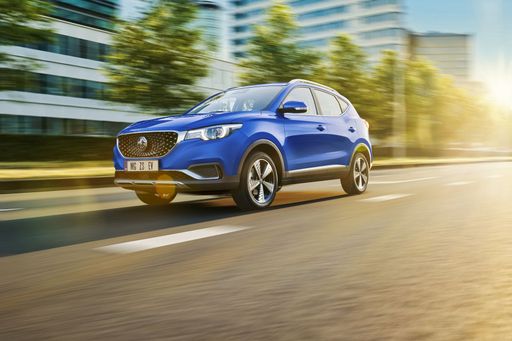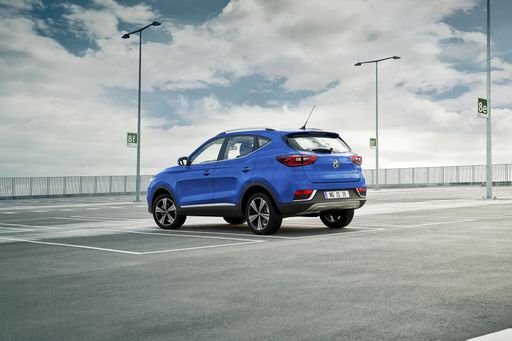MG ZS vs Toyota C-HR - Differences and prices compared
Compare performance (197 HP vs 223 HP), boot space and price (18000 £ vs 29100 £ ) at a glance. Find out which car is the better choice for you – MG ZS or Toyota C-HR?
Costs and Efficiency:
Price and efficiency are often the first things buyers look at. Here it becomes clear which model has the long-term edge – whether at the pump, the plug, or in purchase price.
MG ZS has a clearly advantage in terms of price – it starts at 18000 £ , while the Toyota C-HR costs 29100 £ . That’s a price difference of around 11143 £.
Fuel consumption also shows a difference: Toyota C-HR manages with 0.80 L and is therefore significantly more efficient than the MG ZS with 5 L. The difference is about 4.20 L per 100 km.
Engine and Performance:
Under the bonnet, it becomes clear which model is tuned for sportiness and which one takes the lead when you hit the accelerator.
When it comes to engine power, the Toyota C-HR has a somewhat edge – offering 223 HP compared to 197 HP. That’s roughly 26 HP more horsepower.
In acceleration from 0 to 100 km/h, the Toyota C-HR is somewhat quicker – completing the sprint in 7.40 s, while the MG ZS takes 8.70 s. That’s about 1.30 s faster.
In terms of top speed, the Toyota C-HR performs minimal better – reaching 180 km/h, while the MG ZS tops out at 179 km/h. The difference is around 1 km/h.
Space and Everyday Use:
Whether family car or daily driver – which one offers more room, flexibility and comfort?
Both vehicles offer seating for 5 people.
In curb weight, MG ZS is a bit lighter – 1330 kg compared to 1505 kg. The difference is around 175 kg.
In terms of boot space, the Toyota C-HR offers minimal more room – 447 L compared to 443 L. That’s a difference of about 4 L.
In maximum load capacity, the MG ZS performs evident better – up to 1457 L, which is about 302 L more than the Toyota C-HR.
When it comes to payload, MG ZS hardly perceptible takes the win – 470 kg compared to 425 kg. That’s a difference of about 45 kg.
Who wins the race in the data check?
The Toyota C-HR is far ahead overall in the objective data comparison.
This result only shows which model scores more points on paper – not which of the two cars feels right for you.
Costs and Consumption
View detailed analysis
Engine and Performance
View detailed analysis
Dimensions and Body
View detailed analysis

Toyota C-HR
MG ZS
The MG ZS arrives as a cheeky and practical choice for shoppers who want SUV style and family-friendly space without blowing the budget. It may not pretend to be premium, but with sensible equipment, easy-to-live-with driving manners and surprising value, it makes a persuasive case for anyone after sensible transport with a bit of personality.
details




Toyota C-HR
The Toyota C-HR cuts a striking figure with its angular styling and coupe-like profile, so you’ll never go unnoticed in the supermarket car park. It balances everyday practicality with a nimble, city-friendly personality, making routine commutes feel a touch more fun without asking for forgiveness.
details




Costs and Consumption |
|
|---|---|
|
Price
18000 - 24000 £
|
Price
29100 - 42800 £
|
|
Consumption L/100km
5 - 6.5 L
|
Consumption L/100km
0.8 - 5.1 L
|
|
Consumption kWh/100km
-
|
Consumption kWh/100km
-
|
|
Electric Range
-
|
Electric Range
68 km
|
|
Battery Capacity
-
|
Battery Capacity
-
|
|
co2
113 - 145 g/km
|
co2
17 - 115 g/km
|
|
Fuel tank capacity
41 - 55 L
|
Fuel tank capacity
43 L
|
Dimensions and Body |
|
|---|---|
|
Body Type
SUV
|
Body Type
SUV
|
|
Seats
5
|
Seats
5
|
|
Doors
5
|
Doors
5
|
|
Curb weight
1330 - 1420 kg
|
Curb weight
1505 - 1755 kg
|
|
Trunk capacity
443 L
|
Trunk capacity
350 - 447 L
|
|
Length
4430 mm
|
Length
4362 mm
|
|
Width
1818 mm
|
Width
1832 mm
|
|
Height
1635 mm
|
Height
1558 - 1564 mm
|
|
Max trunk capacity
1457 L
|
Max trunk capacity
1076 - 1155 L
|
|
Payload
375 - 470 kg
|
Payload
375 - 425 kg
|
Engine and Performance |
|
|---|---|
|
Engine Type
Full Hybrid, Petrol
|
Engine Type
Full Hybrid, Plugin Hybrid
|
|
Transmission
Automatic, Manuel
|
Transmission
Automatic
|
|
Transmission Detail
Automatic Gearbox, Manual Gearbox
|
Transmission Detail
CVT
|
|
Drive Type
Front-Wheel Drive
|
Drive Type
Front-Wheel Drive, All-Wheel Drive
|
|
Power HP
116 - 197 HP
|
Power HP
140 - 223 HP
|
|
Acceleration 0-100km/h
8.7 - 12.5 s
|
Acceleration 0-100km/h
7.4 - 9.9 s
|
|
Max Speed
168 - 179 km/h
|
Max Speed
175 - 180 km/h
|
|
Torque
148 Nm
|
Torque
-
|
|
Number of Cylinders
4
|
Number of Cylinders
4
|
|
Power kW
85 - 145 kW
|
Power kW
103 - 164 kW
|
|
Engine capacity
1495 - 1498 cm3
|
Engine capacity
1798 - 1987 cm3
|
General |
|
|---|---|
|
Model Year
2024 - 2025
|
Model Year
2024 - 2025
|
|
CO2 Efficiency Class
C, E
|
CO2 Efficiency Class
C, B
|
|
Brand
MG
|
Brand
Toyota
|
What drive types are available for the MG ZS?
The MG ZS is available as Front-Wheel Drive.




